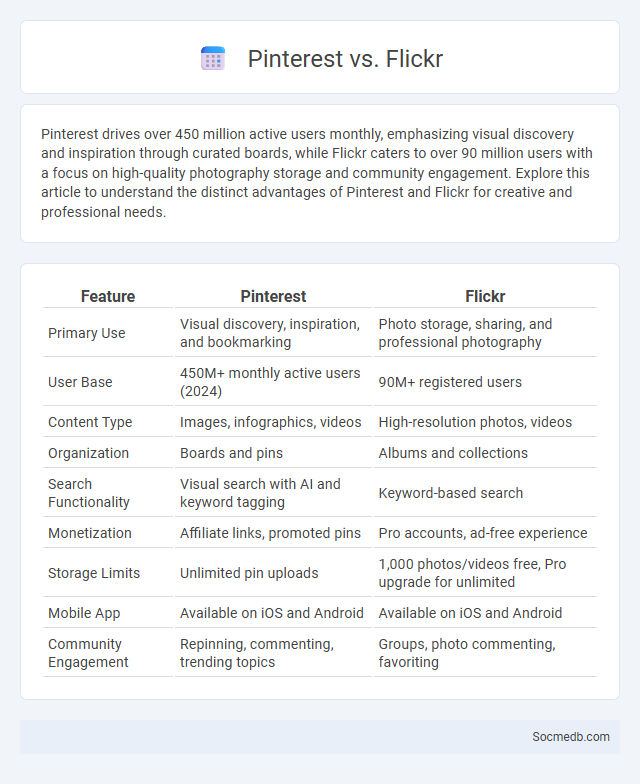
Photo illustration: Pinterest vs Flickr
Pinterest drives over 450 million active users monthly, emphasizing visual discovery and inspiration through curated boards, while Flickr caters to over 90 million users with a focus on high-quality photography storage and community engagement. Explore this article to understand the distinct advantages of Pinterest and Flickr for creative and professional needs.
Table of Comparison
| Feature | Flickr | |
|---|---|---|
| Primary Use | Visual discovery, inspiration, and bookmarking | Photo storage, sharing, and professional photography |
| User Base | 450M+ monthly active users (2024) | 90M+ registered users |
| Content Type | Images, infographics, videos | High-resolution photos, videos |
| Organization | Boards and pins | Albums and collections |
| Search Functionality | Visual search with AI and keyword tagging | Keyword-based search |
| Monetization | Affiliate links, promoted pins | Pro accounts, ad-free experience |
| Storage Limits | Unlimited pin uploads | 1,000 photos/videos free, Pro upgrade for unlimited |
| Mobile App | Available on iOS and Android | Available on iOS and Android |
| Community Engagement | Repinning, commenting, trending topics | Groups, photo commenting, favoriting |
Introduction to Pinterest and Flickr
Pinterest is a visual discovery platform where you can explore and save ideas through images and videos, making it ideal for discovering inspiration in fashion, home decor, recipes, and more. Flickr serves as a photo-sharing platform geared towards professional and amateur photographers, offering high-quality image hosting and community features to share, organize, and showcase your photography portfolio. Both platforms enable visual content discovery, but Pinterest emphasizes idea curation, while Flickr prioritizes image storage and photographic community engagement.
Key Differences Between Pinterest and Flickr
Pinterest emphasizes visual discovery and idea sharing through pins and boards, making it ideal for inspiration in fashion, DIY, and lifestyle. Flickr focuses on high-quality photo storage and community-driven photography sharing, catering to professional photographers and enthusiasts. Pinterest's algorithm curates personalized content, while Flickr offers advanced organization tools and detailed metadata management for images.
User Demographics: Pinterest vs Flickr
Pinterest attracts predominantly female users, with about 70% of its audience being women, primarily aged 25-34, while Flickr's user base is more gender-balanced and skews older, with a significant portion of users aged 35-54. Pinterest's demographic also shows strong engagement from users interested in DIY, fashion, and home decor, whereas Flickr appeals largely to photography enthusiasts and professionals seeking high-quality image sharing and networking. Understanding these demographic distinctions helps marketers tailor content strategies to maximize reach and engagement on each platform.
Visual Content: Types and Purposes
Visual content on social media includes images, videos, infographics, and live streams, each serving distinct purposes such as increasing engagement, enhancing brand storytelling, and simplifying complex information. High-quality photos boost user interaction by making posts more appealing, while videos provide dynamic storytelling that captures attention and conveys messages effectively. Infographics aid in presenting data clearly, improving user understanding and shareability across platforms.
SEO Impact: Search Volume Insights
Social media platforms significantly influence SEO by driving organic traffic and generating high search volumes for branded keywords. High engagement rates on social media signals to search engines the relevance and popularity of content, boosting rankings. Analyzing search volume insights from social trends helps optimize keyword strategies and enhance visibility across search engine results pages (SERPs).
Platform Popularity by Search Trends
Social media platform popularity can be effectively measured through search trends, highlighting which networks users are actively seeking information about. Analysis of search volume reveals TikTok and Instagram consistently dominate, reflecting high user engagement and interest. Understanding these trends helps you tailor your social media strategy to focus on platforms with the greatest growth potential and user reach.
Content Discovery: Algorithms and Reach
Social media platforms utilize sophisticated algorithms to personalize content discovery, analyzing user behavior, preferences, and engagement patterns to deliver highly relevant posts and advertisements. These algorithms prioritize content with higher engagement metrics, such as likes, shares, and comments, expanding the organic reach of creators and brands. Understanding these mechanisms enables marketers to optimize content strategies and enhance visibility across platforms like Facebook, Instagram, and TikTok.
Use Cases: Personal vs Professional
Social media platforms serve distinct purposes in personal and professional contexts, with personal use focusing on social interaction, entertainment, and self-expression across networks like Facebook, Instagram, and TikTok. Professional use cases emphasize networking, brand building, and knowledge sharing on platforms such as LinkedIn, Twitter, and industry-specific forums. Organizations leverage these tools for recruitment, customer engagement, and market research, optimizing content to target demographic insights and enhance digital presence.
Pros and Cons of Pinterest
Pinterest offers a powerful platform for visual discovery, enabling users to find inspiration for fashion, home decor, and DIY projects through curated boards. The platform's strength lies in its highly targeted search and recommendation algorithms, which drive user engagement and help businesses reach niche audiences effectively. However, Pinterest's limitations include the potential for promoting unrealistic lifestyle standards and the challenge of content originality, as many pins are repinned rather than newly created.
Pros and Cons of Flickr
Flickr offers a robust platform for photographers to showcase high-quality images, connect with a global community, and benefit from powerful organizational tools like albums and tags. However, its limited audience compared to other social media giants and occasional interface complexities can hinder your content's visibility and ease of use. Balancing Flickr's strong focus on photo sharing against these challenges is essential for maximizing your social media strategy.
 socmedb.com
socmedb.com